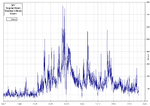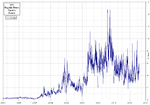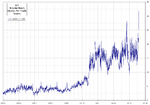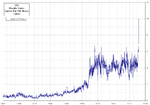i suppose the 'holy grail' is finding out why price moves in the way it does therefore enabling you to 'front run' and make a profit entering and exiting your position.
The Toast is correct in his 'consumption of liquidity' postings and is light years ahead of most people on this thread HOWEVER this is still really the what and not the why, he knows that I suspect and you need to find out the 'why' to unlock the markets.
Totally agreed.
The fact is that there are mechanics to price movement. There is a reason we don't trade 1640 one minute, then 1400 the next, then 1923 the next and 300 the next. The reason behind that is the way liquidity works in a 4 way auction.
So that is mechanics of price movement. It is both the "why does price move" and the "why doesn't price move all over the place".
It is not "what motivated people to buy at this point?". That is not the mechanics of price movement. The speculative model leads you to certain decision points in the market or lines in the sand where you might not know 100% what people will do but you sure know what will happen if the line is crossed OR if it fails to cross the line.
Longer term - the tail wags the dog or the dog wags the tail. Does futures trading provide price stability or cause instability? Jury is out on that one but I stand by my opinion that it is the latter.
T
he arguments about futures being infinite are a bit of a side show here, as Toast has said all you need to magic up a futures transaction is any 2 people on both sides of the trade. Think about it I could have £10k in my account and another punter could have £10k, we could buy and sell to each other all day long, millions of contracts, does this mean the underlying is more scarce/plentiful, of course not, hence the supply/demand of contracts notion isn't helpful.
Supply and demand is not a great term to use for finding the why as it is really the amount of contracts people are willing to step up and buy or sell at any given price/time. If price is currently 7 and there are ton of people who are willing to buy it if it drops to 6 we could say there is a 'supply' of people who are willing to step up and buy at 6 BUT not a good idea to start thinking that there is supply of contracts or underlying, see the difference.
Cheque's in the post.
Now onto the point where Toast locked horns with others about fundamentals of supply and demand. The Toast is talking on a micro level so is strictly correct however lets take the current oil price as an example. News of an imminent scuffle in the middle east will cause people to 'believe' that oil prices will rise. Less people in the market will be willing to offer in the market than bid with the market believing price could/should/will rise. Once people step up and buy there will be less liquidity above to consume and therefore price will rise. So the perception of fundamental aspects and participants actions move price.
Toast is right about the short term speculators governing price in the short term however when a perceived big piece of data arrives this trumps everything. In short you need to know what is the driver at any moment.
See - I agree with this but I don't agree that I am discussing the micro-level. Both L_V and I will look at the paragraphs above and think "he's just proved my point" because we both have fixed ideas about the tail and the dog.
I look at the above and think that it absolutely proves my point - news comes out and then people speculate about it. They think other people will buy oil higher later on and they and up effectively front-running/gaming the market which causes the actual price rise.
T
So now onto the 'why', that's what you need to know. Here is some stuff to chew on.
Q.When do you want to buy or sell? Think about this, 99% of people cant answer.
I can tell you I want to buy when people are willing to buy at higher prices than I paid AND are less people are willing to sell above me.
It's also helpful to think about the people who can move the market you are trading, the people who trade size. If size trades you can compare what happens to what should happen.
:smart:
Good stuff. There is no doubt that, to a point, higher prices attract more buyers. That's not just the case in financial markets but all markets. Housing bubbles for instance tend to work this way.
Am I the only one here that had brought the high tick of a market? Some of it is human nature but some of it is the fact that the buying reached a crescendo and actually ensured that this became the high tick. It also explains why quite often, a market has to move down before it can move up.
The best way to think about this is not to think that those who brought are buyers. Anyone who already brought is a seller. So, as prices rise, some might think "look at all these buyers" but I think "look at all these future sellers".
Because futures markets are so speculative, very few hold till expiry, so they are not consumers. If you go back to the apple analogy. Most buyers are future eaters, not future sellers.




